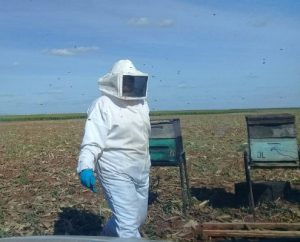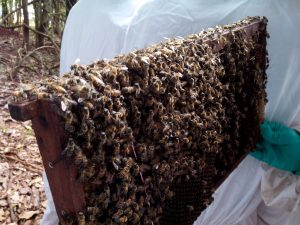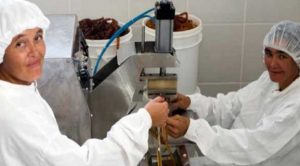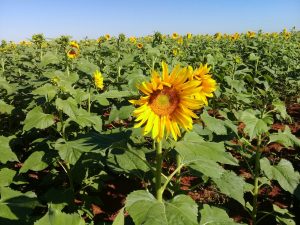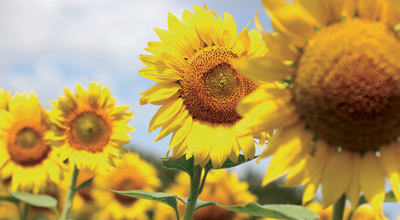
Campo Grande (MS) – If a single sunflower is capable of attracting attention and awakening smiles due to the exuberance of its color. Then imagine hundreds or thousands of them gathered on a single plot of land forming a large crop, or, so to speak, a giant bouquet. It's like this in Chapadão do Sul, where every year the flowers give a special color to the “Gávia” farm, brightening the environment, generating income for its owner and serving as a source of income, including for family farming through migratory beekeeping.
In 500 hectares of cultivation, sunflowers share space with another living being with yellowish pigmentation: bees of the species Apis mellifera, popularly known as the “European bee” or “European bee”. A smart way to guarantee pollination of flowers and avoid the honey harvest at the same time. “We’ve been getting honey from sunflowers for years. Unlike wildflowers [spring period], sunflower honey is almost transparent, a very beautiful yellowish color and the flavor is as good as the darker one”, says beekeeper Rosângela Vargas.
In addition to guaranteeing the product's flavor, the other advantage is the continuous production of honey and its derivatives. “Before, we expected the traditional, wild flowering, which starts in mid-September and lasts until December or January. Now, it’s practically honey all year round, once we start taking the hives to the fields there’s no such wait,” he says.
Another guaranteed gain is for large producers who decide to open the gates to beekeeping. “Mr. Ronan Zocal and his family have always loved working with sunflowers. They have been working with this for over 10 years and we have known for a while that bees help pollinate flowers, stimulating flowering”, says the farm manager, Carlos Alberto Almeida.
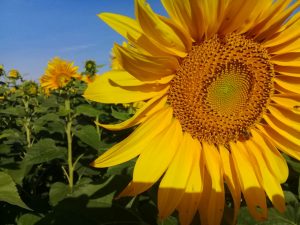
Image: Agraer (Chapadão do Sul)
On the farm, a small portion of the sunflower seeds are used for oil production. The largest portion is separated for caring for birds, that is, preparing feed. A crop that in one way or another feeds living beings and repays care with a sweet flavor. “For each box we leave on the farm, we pass on a kilo of honey to the owner. I believe everyone wins. We have honey all year round and the large producers also benefit”, observes the beekeeper.
Honey all year round
The main objective of migratory beekeeping is exactly to ensure that the beekeeper does not need to look for other forms of production and can dedicate himself more and better to beekeeping. “Migratory beekeeping requires some management care, but it is advantageous for beekeepers and farmers. It is a work that observes the flowering cycle: first comes the eucalyptus, in some areas, then the sunflower, the forage turnip soon after, then the grape vine and the wild flowering, the usual time of spring”, details the municipal coordinator from Agraer in Chapadão do Sul, Reinaldo dos Santos, better known among his co-workers and family farmers as “Braquiara”.
To take advantage of the full potential of sunflowers, 60 boxes were placed on the farm by beekeeper Rosângela alone. “There, I have my swarms because there is no longer any eucalyptus flowering and, soon, forage turnips will start on the farm. There, sunflowers started in April and lasted until mid-June. There are some drying, others blooming and mature flowers. Planting started a little later. The turnip should stay from May to August”, he calculates.
Rosângela follows the profession of her father, Olavo Vargas, who passed away two months ago, leaving behind his memories, knowledge and love for nature. “I'm taking care of it. I always worked with him. Not to mention that in addition to honey, bees do important pollination work”, he recalls.
And the beekeeper is right. According to data from the Food and Agriculture Organization of the United Nations – FAO/2014, it is estimated that approximately 73% of plant species cultivated in the world are pollinated by some species of bee, flies (19%), bats (6.5%), wasps and beetles (5%), birds (4%), and butterflies and moths (4%).
In Chapadão do Sul, Camapuã and Campo Grande, for example, the integrated system of bees, agriculture and native forest generates around 5 tons of pollen per year. In Silviculture, in terms of partnership between cellulose companies and associations (Cassilândia, Chapadão do Sul, Amambai, Três Lagoas and Brasilândia) approximately 100 thousand hectares are used with 14,670 hives, based on a survey in 2014, carried out by the Beekeeping and Meliponiculture Federation of Mato Grosso do Sul (Feams).
Promising market
With its different practices, beekeeping has generated production alternatives and significant gains for Brazil within the export market. 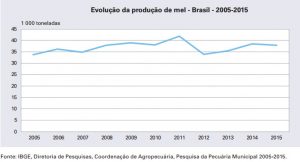
This practice combined with the traditional bee farming sector caused the country to jump in the ranking from 15th to 8th position, in less than ten years, according to data from the commercial intelligence area of Abemel (the Brazilian Association of Honey Exporters) . In terms of quantity, 37.82 thousand tons were produced in 2015.
According to the latest research released by IBGE, the value of total honey production in 2015 was R$ 358.85 million, indicating an increase of 13.9% compared to 2014. The national average price was R$ 9.49 per kilo of product. The highest average price was recorded in the North (R$ 15.64), while the lowest was in the Northeast (R$ 8.34).
And the good news is not restricted to commercialization as Brazil has a favorable scenario for honey cultivation with large areas of native forests associated with good intercropping practices (integration of agriculture and beekeeping). “If bees are present in cultivation areas, care must be taken to avoid applying pesticides to crops”, says Agraer coordinator Reinaldo.
Details in the management of hives that make a difference in the quality of the final product (pollen, royal jelly, propolis and honey). Compared to China, a country considered the world's largest honey producer, Brazil has great advantages and attracts the attention of the North American and European markets, which are increasingly looking for excellent honey, without the presence of antibiotics or chemical components. , pesticides or heavy metals.
Due to the high level of environmental pollution, it is common in some Asian countries to use antibiotics to combat diseases or strengthen bees. Such practices have put many countries on alert regarding the quality of honey, with stricter requirements regarding the origin of the product. These factors influenced the appreciation of Brazilian honey on the foreign market, since the beekeeping system here uses a sustainable and pesticide-free production model.
According to data from Agraer, the main importers of Brazilian honey are Germany, the United States, Japan, France and the United Kingdom. International purchases are around 300 thousand tons/year. So much demand encourages beekeepers to pursue associations as a way of strengthening production and serving the consumer market.
Honey from the cerrado
Currently, Mato Grosso do Sul occupies the 10th position in honey production in Brazil, with an estimated production of around 830 tons/year. The state scenario includes 715 beekeepers, 500 of which are registered with Iagro – State Agency for Animal and Plant Health Defense Government of the State of Mato Grosso do Sul.
The first three places in the national ranking are, respectively, Paraná (6.29 thousand tons/year), Rio Grande do Sul (4.96 thousand tons/year) and Bahia (4.60 thousand tons/year).
It is estimated that there are around 21 thousand hives throughout our state and 42 associations. Add to these numbers also the 19 warehouses, important points for storing and caring for honey so that it is suitable for human consumption. In total, there are 10 municipal warehouses, 7 state units and 2 Federal Inspection Service (SIF).
To boost local production, Agraer has invested over the years in the beekeeping sector through courses, monitoring in apiaries, project development and transfer of equipment via the State government. So much so that, in 2015, R$ 350 thousand were transferred to purchase equipment (centrifuge, uncapping table, sachet machine) and training costs for the formation of a warehouse in Aquidauana. The site provides services to 9 other cities: Anastácio, Guia Lopes, Jardim, Maracaju, Nioaque, Miranda, Corumbá, Coxim and Nova Andradina.
The work involving different institutions to develop the “Mel do Pantanal” certification, technically known as GI (Geographic Identification) is another attraction to reach the international market and improve the technologies adopted by beekeeping in Mato Grosso do Sul.
Despite the challenges and price fluctuations, the entire scenario already described above, added to the growing practice of migratory beekeeping, makes us believe that the future is promising for Brazilian beekeeping.
Mobile or migratory beekeeping meets the pollination needs of orchards and crops for the production of seeds and fruits. Brazil, as one of the main food producers in the world, cannot disregard the participation of bees to guarantee the production of an extensive range of foods.
The representation of bees is so interconnected with agricultural production that professionals or those curious about the subject can visit the campaign page “No Bee No Food” also known as “Bee Or Not To Be”, a reference to the well-known phrase by the English poet Shakespeare. There, it is possible to see a little about the great importance of preserving this tiny insect, both for the environment and for our enjoyment on the shelves of markets, pharmacies and open-air markets that sell honey and its derivatives.
Text: Aline Lira – Agraer Communications Advisor
Source: AGRAER


